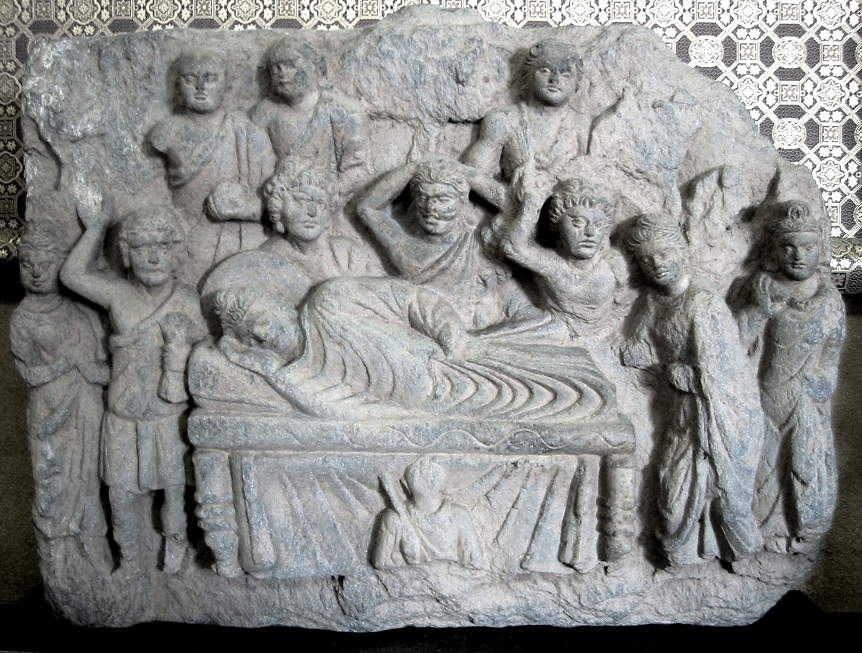Sand Dancer
Crazy Cat Lady
I haven't been able to find an answer. If you're not going through rebirth, what happens after you die?
Welcome to Religious Forums, a friendly forum to discuss all religions in a friendly surrounding.
Your voice is missing! You will need to register to get access to the following site features:We hope to see you as a part of our community soon!
Same thing as this life.I haven't been able to find an answer. If you're not going through rebirth, what happens after you die?
So the benefit of Nirvana is being enlightened? I wasn't sure if it meant you stopped being reborn.Same thing as this life.
You get born.
Buddha said that after his death even Gods Brahma and Indra will not be able to find him. He will be gone, gone, gone far, gone completely.I haven't been able to find an answer. If you're not going through rebirth, what happens after you die?
Nope. It just means immediately forgetting all this, everything, when you die, including ego, that weird thing called enlightenment, and that great tasting pizza,. Starting back at square one as soon as the 'lights' come on with birth.So the benefit of Nirvana is being enlightened? I wasn't sure if it meant you stopped being reborn.
I just want to point out that Buddhism really isn't dogmatic to the point whereas there are "official" answers to most questions. Instead, the encouragement is for us to study and contemplate what may appear to be most likely, thus the statement "If you see the Buddha, kill him". IOW, he's not the "final answer".I haven't been able to find an answer. If you're not going through rebirth, what happens after you die?
You can taste this wonderful pizza anytime you want. It needs total abandonment of prejudice.Nope. It just means immediately forgetting all this, everything, when you die, including ego, that weird thing called enlightenment, and that great tasting pizza,. Starting back at square one as soon as the 'lights' come on with birth.
In Buddhism, parinirvana is commonly used to refer to nirvana-after-death, which occurs upon the death of someone who has attained nirvana during their lifetime.I haven't been able to find an answer. If you're not going through rebirth, what happens after you die?
It's why the Best Buddhist answers are made in complete silence. Leaving only the unanswerable question. :0)I just want to point out that Buddhism really isn't dogmatic to the point whereas there are "official" answers to most questions. Instead, the encouragement is for us to study and contemplate what may appear to be most likely, thus the statement "If you see the Buddha, kill him". IOW, he's not the "final answer".
Thanks!In Buddhism, parinirvana is commonly used to refer to nirvana-after-death, which occurs upon the death of someone who has attained nirvana during their lifetime.
You might find these articles useful.

Parinirvana - Wikipedia
en.wikipedia.org

Parinirvana
encyclopediaofbuddhism.org
Buddha put the unanswerable questions as 'acinteyyas', said that they don't help in alleviation of sorrow.It's why the Best Buddhist answers are made in complete silence. Leaving only the unanswerable question. :0)
That is confusing to me. This westernized brain can't comprehend that.An enlightened person has transcended time. There is no longer any "after."
Nor can any unaltered brain. We're designed to survive and reproduce. We have the degree of cognition need for this function. More would be a waste of energy.That is confusing to me. This westernized brain can't comprehend that.
Buddha gave the correct reply - "Gate, Gate, Pārgate, Pārsamgate" (Gone, Gone, Gone completely, Gone completely without any remainder).I haven't been able to find an answer. If you're not going through rebirth, what happens after you die?
IMV, the molecules of your body find a home in millions of living and non-living things.Same thing as this life. You get born.
Nirvana is understanding, cessation of doubts. Other things do not change.So the benefit of Nirvana is being enlightened? I wasn't sure if it meant you stopped being reborn.
Informative, thanks!Buddha gave the correct reply - "Gate, Gate, Pārgate, Pārsamgate" (Gone, Gone, Gone completely, Gone completely without any remainder).
Advaita Hinduism holds the same view. Whether enlightened or non-enlightened, what happens to anything, living or non-living, is chemical recycling. The molecules of the body disperse in the environment and become parts of millions of living and non-living entities.
IMV, the molecules of your body find a home in millions of living and non-living things.
Nirvana is understanding, cessation of doubts. Other things do not change.
Generally, Buddhist teaching views life and death as a continuum, believing that consciousness (the spirit) continues after death and may be reborn. Death can be an opportunity for liberation from the cycle of life, death and rebirth.
Rituals and in some cases precise beliefs surrounding death vary among Buddhist traditions. Tibetan Buddhism has defined practices and protocols that should be followed in times of death. For example, special prayers are said before death, during the dying process and for several days after death. The Mahayana (Chan/Zen, etc.) and the Western Buddhist approaches are relatively less defined; in these traditions prayers are held during the dying process, while the stages at which prayers are held and the length of these prayers vary.
